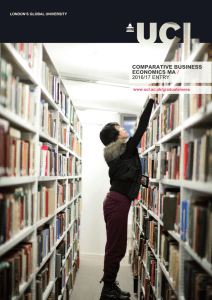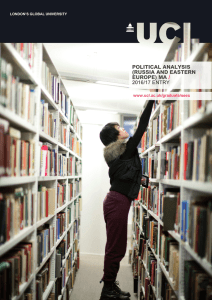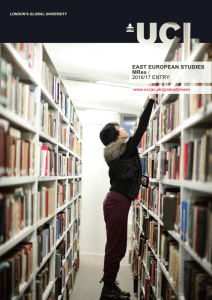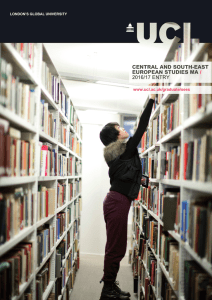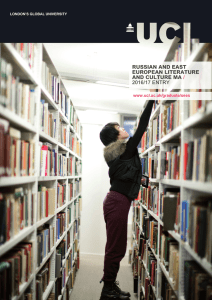COMPARATIVE ECONOMICS AND POLICY MA / 2016/17 ENTRY
advertisement
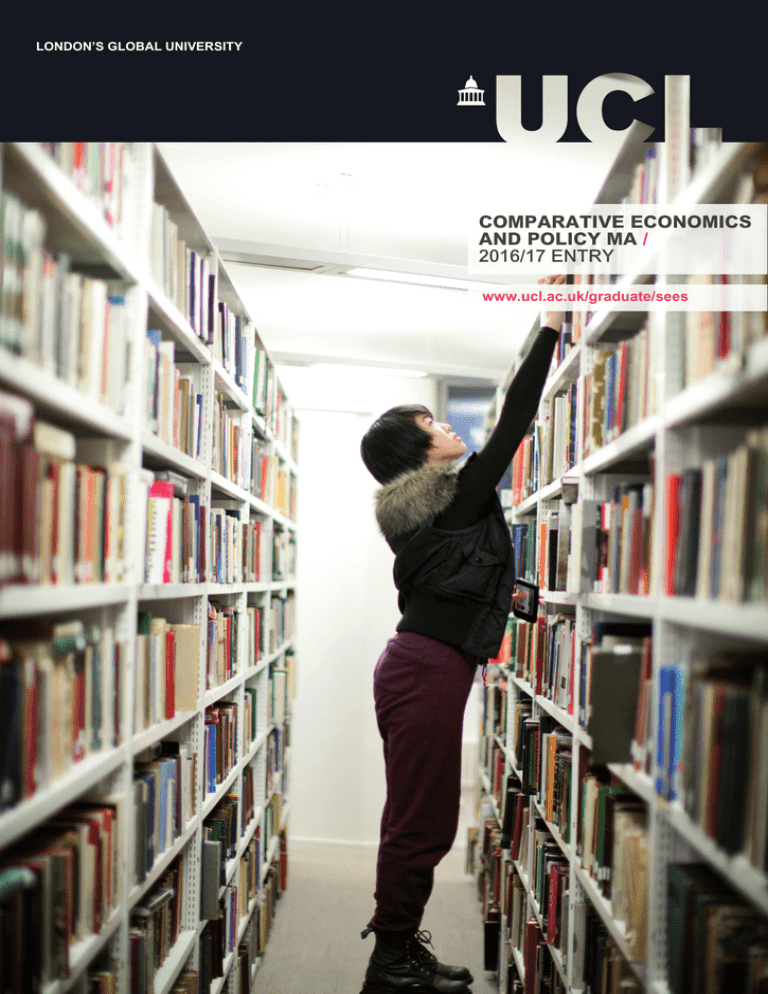
LONDON’S GLOBAL UNIVERSITY COMPARATIVE ECONOMICS AND POLICY MA / 2016/17 ENTRY www.ucl.ac.uk/graduate/sees Comparative Economics and Policy MA / This Master's programme is an applied, policy-oriented programme reflecting SSEES's leading-edge expertise in comparative economics. The programme is centred around the economics and economic policy of emerging markets, viewed through the prism of Eastern Europe and the former Soviet Union, but relevant to the emerging economies and societies of South and South East Asia, the Middle East and North Africa as well as Latin America. Degree summary The programme focuses on the development experiences of the 28 nations that have emerged from the former Soviet bloc in Europe and Asia. Students analyse the impact of institutional reforms on diverse outcomes, including economic performance, socio-economic development, financial integration, democratisation, innovation and entrepreneurship, and internationalisation. // // // The UCL School of Slavonic & East European Studies (SSEES) is a world-leading specialist institution, and the largest national centre in the UK, for the study of central, Eastern and South-east Europe and Russia. Located on the edge of Bloomsbury, SSEES offers an ideal location for scholars. The British Library, British Museum, University of London Library and other similar research centres are all close by. Our nationally unequalled specialist library and central London location provide an ideal environment for research, while our close contacts with employers, policy-makers and alumni afford excellent opportunities for networking and career development. The programme is delivered through a combination of lectures, seminars, presentations, laboratory sessions and workshops. Students will be assessed by a variety of methods: unseen examinations, long essays, course work and the research dissertation. Degree structure Mode: Full-time: 1 year; Part-time: 2 years Students undertake modules to the value of 180 credits. The programme consists of three core modules (60 credits), a choice of a further one of three core modules (15 credits), optional modules (45 credits), and a research dissertation (60 credits). CORE MODULES // Quantitative Methods // Advanced Quantitative Methods // International Macroeconomic Policy // At least one of the following: // Public Choice - Private Interest // Economics of Health and Population // Trade and FDI Policy with reference to Eastern Europe // Development Economics and Policy OPTIONS // Any of the remaining Core Modules // Advanced Qualitative Methods // Causes, Consequences and Control: Corruption and Governance // Corporate Governance // Corporate Finance and Investment in Emerging Markets // Financial Development // Informal Practices in Post-Communist Societies // Political Economy of Health, Development and Welfare // Property Rights // Energy, Technology and Innovation // Language modules offered by SSEES // Modules from UCL's School of Public Policy and UCL Economics DISSERTATION/REPORT // All MA students undertake an independent research project, which culminates in a dissertation of 10,000–12,000 words. Your career With their specialist knowledge and language skills, SSEES Master's graduates can be found in business, finance, the media, international agencies, charities, diplomacy, international security organisations, the law, and academe. Recent career destinations* include: // // UCL, PhD student China Merchant Bank, Bank Manager, 2012 Employability The MA opens up a range of opportunities and we expect that graduates from this programme will go on to work in think-tanks, political parties, national, European and international private and public sector organisations and in media and non-governmental organisations as economic and political analysts. Similarly, we hope others will go on to doctoral studies. Networking is facilitated by two major collaborations led by SSEES: CEELBAS and the International Master's (IMESS). Scholarships, internship opportunities and excellent links with other universities in the region provide further benefits. * data taken from the ‘Destinations of Leavers from Higher Education’ survey undertaken by HESA looking at the destinations of UK and EU students in the 2010–2012 graduating cohorts six months after graduation and, where necessary, departmental records. Entry requirements A minimum of an upper second-class Bachelor's degree in a relevant discipline from a UK university or an overseas qualification of an equivalent standard. Applicants are usually expected to have studied one term of both microeconomics and macroeconomics in their undergraduate degree. FEES AND FUNDING // UK & EU (2016/17) entry: £10,660 (FT) // Overseas (2016/17) entry: £18,670 (FT) // UK & EU (2016/17) entry: £5,465 (PT) // Overseas (2016/17) entry: £9,285 (PT) English language proficiency level AHRC Scholarships may be available. If your education has not been conducted in the English language, you will be expected to demonstrate evidence of an adequate level of English proficiency. Full details of funding opportunities can be found on the UCL Scholarships website: www.ucl.ac.uk/scholarships The level of English language proficiency for this programme is: Good. Information about the evidence required, acceptable qualifications and test providers is provided at: www.ucl.ac.uk/graduate/english-requirements Your application The deadline for all applicants is 1 March 2016. Students are advised to apply as early as possible due to competition for places. Those applying for scholarship funding (particularly overseas applicants) should take note of application deadlines. When we assess your application we would like to learn: // why you want to study Comparative Economics and Policy at graduate level // // // why you want to study Comparative Economics and Policy at UCL // where you would like to go professionally with your degree what particularly attracts you to this programme how your personal, academic and professional background meets the demands of a challenging and truly international academic environment Together with essential academic requirements, the personal statement is your opportunity to illustrate whether your reasons for applying to this programme match what the programme will deliver. Details on how to apply are available on the website at: www.ucl.ac.uk/graduate/apply PDF Updated: May 25, 2016 Information correct at time of going to press. See website (http://www.ucl.ac.uk/ssees) for latest information APPLICATION DATE All applicants: 1 March 2016 CONTACT Email: maadmissions@ssees.ucl.ac.uk Telephone: +44 (0)20 7679 8810
